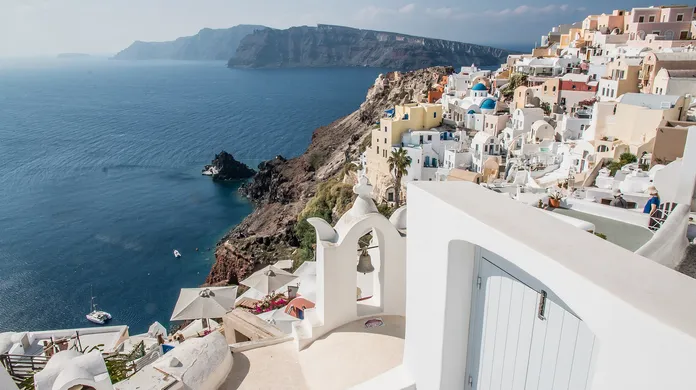The famous Greek island of Santorini, one of the world’s most iconic tourist destinations, is facing an unprecedented crisis after being hit by a series of over 500 earthquakes recorded in the past few days. The intense seismic activity, which began to intensify at the end of last week, has forced thousands of residents and tourists to leave the island in search of safety. The phenomenon, known as a “seismic swarm,” is being studied by seismology experts who are trying to understand the causes of the earthquake sequence.
According to information from the Greek public broadcaster ERT, more than 6,000 people have left Santorini since the crisis began. On the morning of Tuesday (February 4), the island’s main port turned into a scene of mass evacuation, with hundreds of people carrying suitcases, bags, and even improvised personal belongings while waiting for ferries to Athens and other areas on the Greek mainland. The atmosphere was one of tension and uncertainty, with long lines forming and anxiety visible on the faces of those waiting for transportation. Some families reported sleeping outdoors, fearing to return to their homes due to the risk of further tremors.

The strongest tremor so far, with a magnitude of 4.9, was recorded last weekend, followed by another earthquake of 4.8 on the morning of Tuesday. In addition to these, approximately 550 smaller tremors, around 3.0 in magnitude, have been recorded in the Aegean Sea region, affecting not only Santorini but also the neighboring islands of Amorgos and Ios. Experts from the Greek Earthquake Planning and Protection Organization (OASP) have warned that the sequence of tremors could persist for several days or even weeks, heightening fears among residents and visitors. The possibility of a larger earthquake concerns authorities, who have increased the presence of rescue teams and rapid response units in the region.
Santorini, known for its iconic white houses with blue domes and breathtaking sunset views over the volcanic caldera, is nicknamed the “Instagram Island” due to its popularity on social media. Despite attracting around 3.4 million tourists annually, the island has a resident population of approximately 20,000 people. Many of these residents, accustomed to the island’s tranquil daily life, are now facing a reality marked by fear and uncertainty. The economic impact is already being felt, with hotels, restaurants, and shops temporarily closing their doors, affecting local workers and business owners who rely on tourism.
Julian Sinanaj, a 35-year-old resident who has lived and worked in Santorini for years, expressed shock at the situation. “I work on the island, I’ve been a resident for years. But today… no one expected this to happen. What’s happening on the island now is unbelievable. People are in panic, leaving their homes with whatever they can carry, trying to find a safe place,” he told Reuters. Other residents described the terrifying sound of the tremors, which occur at any time of day or night, shaking walls and causing objects to fall inside homes.
Greek authorities are closely monitoring the situation, with emergency teams on alert to respond to potential landslides and other risks associated with seismic activity. While no fatalities have been reported so far, there are reports of damage to historic buildings, cracks in roads, and power outages in some areas of the island. Centuries-old churches, which are part of Greece’s cultural heritage, have suffered damage, and civil engineers have been sent to assess the integrity of public and private buildings.
The Greek government has also recommended that tourists avoid non-essential travel to Santorini and nearby areas until seismic activity subsides. Meanwhile, the local population faces the challenge of dealing with the constant threat of further tremors, in a scenario that starkly contrasts with the paradisiacal image for which the island is globally known. The uncertainty about the near future is exacerbated by the emotional impact of the experience, with many residents reporting difficulty sleeping and a sense of vulnerability that contrasts with the island’s usual serenity.
International seismology experts have been invited to collaborate with Greek authorities in analyzing the seismic activity. Preliminary studies suggest that the movement of tectonic plates in the Aegean Sea region may be related to a reactivation of dormant geological faults. The Institute of Geodynamics in Athens is conducting continuous monitoring, using advanced technology to predict possible developments and provide updated guidance to the population.
In addition to the immediate implications for the safety of residents and tourists, the long-term economic impact is concerning local authorities and the tourism sector. The summer season, which typically brings a heavy influx of visitors, may be severely affected, with booking cancellations and a contraction in commercial activities. The Greek government is evaluating financial support measures for those affected, including subsidies for small businesses and emergency assistance for displaced families.
While Santorini faces this challenging situation, solidarity among the residents stands out. Local communities are organizing to provide temporary shelter, food, and emotional support to the most vulnerable. The hope is that, over time and with the right support, the island can recover and resume its vibrant cultural and tourist life, which continues to captivate visitors from around the world.
The seismic crisis in Santorini exposes the vulnerability of regions highly dependent on tourism and underscores the importance of disaster preparedness in areas prone to intense geological activity. While the current situation is marked by uncertainties and challenges, the resilience shown by the local population, along with the coordinated efforts of authorities and the international community, offers a hopeful perspective. Santorini’s future will depend not only on the reduction of seismic activity but also on the island’s ability to adapt and rebuild, preserving its rich cultural heritage and its significance in the global tourism landscape.

